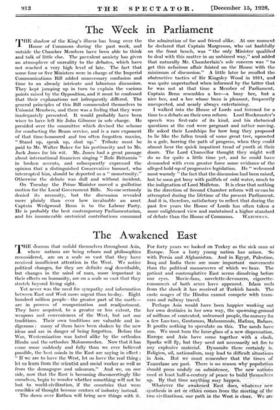The Week in Parliament T HE shadow of the King's illness
has hung over the House of Commons 'during the past week, and outside the Chamber Members have been able to think and talk of little else. The prevalent anxiety has given an atmosphere of unreality to the debates, which have not reached a very high level of late. The fact that some four or' five Ministers were in charge of the Imperial Communications Bill added unnecessary confusion and time to an already intricate and laborious discussion. They kept jumping up in turn to explain the various points raised by the Opposition, and it must' be confessed that their explanations not infrequently differed. The general principles of this Bill commended themselves to Unionist Members, and there was a feeling that they were inadequately presented. It would probably have been wiser to have left Sir John Gilmour in sole charge. He presided over the committee which devised the scheme for conducting the Beam service, and is a rare exponent of that time-honoured and too often forgotten maxim, " Stand up, speak up, shut up." Tribute must be paid to Mr. Walter Baker for his pertinacity and to Mr. Jack Jones for his wit. Mr. Jones had a great passage about international financiers singing " Rule Britannia " in broken accents, and subsequently expressed the opinion that a distinguished Conservative baronet, who interrupted him, should be deported as a " monstrosity." Otherwise the debate was dull and without incident.
On Tuesday the Prime Minister moved a guillotine motion for the Local Government Bills. No one seriously denied its necessity, but the discussion revealed more plainly than ever how invaluable an asset Captain Wedgwood Benn is to the Labour Party. He is probably the best contemporary Parliamentarian, and his innumerable oratorical contributions command the admiration of foe and friend alike. At one moment he declared that Captain Margesson, who sat bashfully on the front bench, was the only Minister qualified to deal with this matter in an unbiased way," and added that naturally Mr. Chamberlain's sole concern was " to get this nefarious affair foisted on the House with the minimum - of discussion:" A little later he recalled the obstructive tactics of Sir Kingsley Wood in 1911, and was quite unperturbed when informed by the latter that he was not at that time a Member of Parliament.
Captain Benn resembles a bee a busy bee, but a nice bee, and a bee whose buzz is pleasant, frequently unexpected, and nearly always entertaining.
I walked into the House of Lords and listened for a time to a debate on their own reform. Lord Buckmaster's speech was first-rate of its kind, and his rhetorical questions at the end were- pregnant and rather moving: He asked their Lordships for how long they proposed to lie like the fallen trunk of some great tree, uprooted in a gale, barring the path of progress, when they could almost hear the quick impatient tread of youth at their doors. The Lord Chancellor thought they might well do so for quite a little time yet, and he could have demanded with even greater force some evidence of the alleged hold-up of progressive legislation. He " welcomed most warmly " the fact that the discussion had been raised, but he soon got busy with pailfuls of cold water, much to the indignation of Lord Midleton. It is clear that nothing in the direction of Second Chamber reform will or can be attempted during the lifetime of the present Parliament. And it is, therefore, satisfactory to reflect that during the past few years the House of Lords has often taken a more enlightened view and maintained a higher standard of debate than the House of Commons. WATCHMAN.








































 Previous page
Previous page